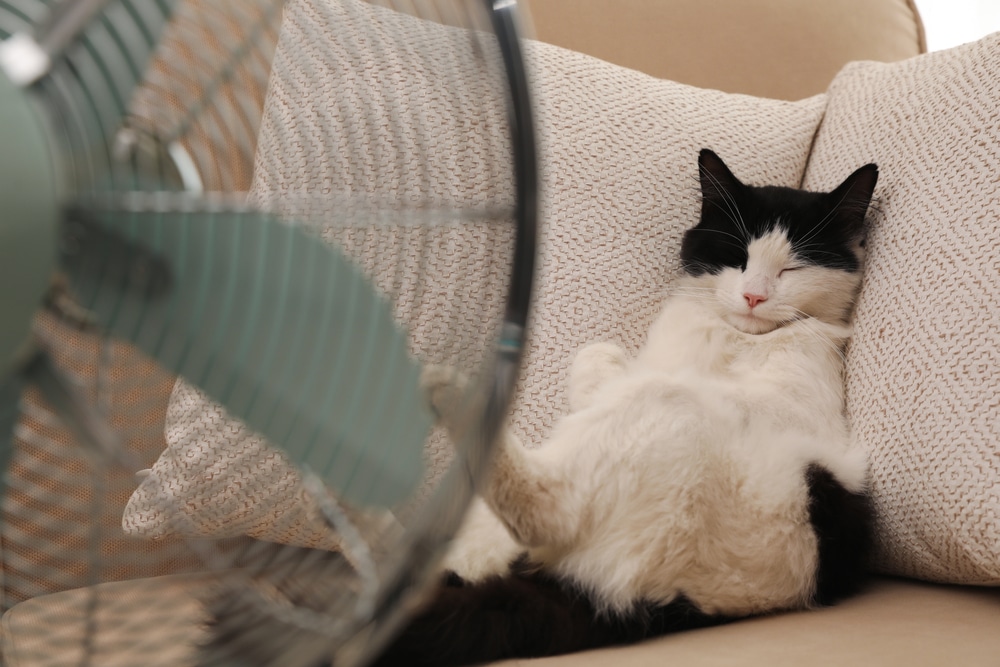On Independence Day, many people gather for backyard parties to celebrate our nation’s freedom with family and friends. Fireworks are a popular way to mark the occasion, but they can be distressing for pets who go missing on July Fourth more than on any other day of the year. Independence Day is also one of the busiest for veterinary hospitals, as pets are often exposed to various health hazards, from overheating to eating potentially harmful foods. To keep your pet safe this holiday, our Pets & Friends Animal Hospital team has created this guide for you.
Prevent your pet from getting lost on July Fourth
Animal control officers report that more pets go missing between July 4th and 6th than at any other time of the year. The noise from fireworks, parades, and loud backyard celebrations can cause your pet to become frantic and run away. To prevent your pet from getting lost, follow these steps:
- Check identification (ID) tag information — Ensure your pet has up-to-date ID tags on their collar or harness and that your contact information is current.
- Have your pet microchipped — Have your pet microchipped and double-check that the registration information is correct in the microchip registration database.
- Ensure your yard is secure — Walk your yard and fence line to ensure your pet can’t escape if startled.
Leave your pet at home
Although bringing your pet to the celebrations may be tempting, staying home is much safer and more comfortable for them. Don’t risk having your pet overheat, eat something toxic, or feel stressed. Create a quiet, cozy spot indoors where your furry pal can relax during the festivities. To do this, follow these tips:
- Set up a crate, a small bedroom, a laundry room, or a bathroom with soft blankets and your pet’s favorite toys.
- Close shades or drapes to block bright lights.
- Play soft music or white noise to mask loud noises.
- Use pheromones to help calm your pet.
- Distract your pet with a treat-filled KONG or another favorite toy during parties or fireworks.
- If you are home, check on your pet often.
- Consider outfitting your pet in a Thundershirt or other anti-anxiety wrap to help them stay calm.
- If your pet needs more help staying calm, call our team in advance of July Fourth to discuss a prescription for anti-anxiety medication.
- Ensure your pet doesn’t have access to outside doors and that gates are securely locked.
Prevent your pet from getting burned or poisoned
Spent fireworks are toxic if ingested and can also burn your pet’s mouth, nose, or paws if they come across them in your yard or neighborhood. Fireworks that move or eject upward, if misused, can hit a pet and cause burns and trauma. Don’t let your pet chase, chew, or have access to fireworks.
Prevent your pet from eating toxic foods and bones
Each year, veterinary hospitals treat pets suffering from gastrointestinal (GI) obstruction, vomiting, and pancreatitis because they ingested something they shouldn’t have during the July Fourth celebration. Certain foods are toxic, even lethal, for pets. Bones can splinter, damaging or lodging in a pet’s GI tract, needing surgery to be removed. Remind guests that they should not share any food with your pet. In addition, keep your pet safe by considering the following:
- People’s food, such as alcohol, onions, grapes, xylitol, and chocolate, are dangerous to your pet.
- Bones or greasy meats and foods can lodge in your pet’s digestive system or cause them pancreatitis, a painful, sometimes life-threatening condition.
- Immediately put food scraps in a secure trash can and put leftovers in secure containers in the refrigerator.
- Hot barbecue grills can burn your pet and cooking utensils, such as skewers, can injure them.
- Corncobs are choking hazards.
Keep your pet safe around water
If your July Fourth fun includes boating, the beach, or water play, ensure your pet is safe by outfitting them in a life jacket. Some dogs can swim, but some cannot, and an unexpected fall, fatigue, or a rogue wave could cause problems for even a strong swimmer.
Prevent your pet from overheating 
Exposure to hot and humid weather can cause your pet to overheat and suffer from heat exhaustion or heatstroke, requiring veterinary care. Overheating signs include excessive panting, restlessness, dark red or blue gums, and staggering. In warm weather, monitor your pet’s time in the sun, limit their exercise time and intensity, and ensure they can retreat to the shade whenever needed. Provide constant access to fresh, cool water, and never leave a pet in a parked car. If you suspect your pet is suffering from heatstroke, immediately take them to your nearest pet emergency hospital.
Follow these tips to help keep your pet safe on July Fourth. However, even with the best plans, things can go wrong. Keep your nearest veterinary emergency clinic’s phone number close by and learn the quickest route to get there. Creating a pet first aid kit can help provide basic first aid to your furry friend before heading to the veterinary hospital. To learn additional tips for keeping your pet safe this summer, contact our Pets & Friends Animal Hospital team.

